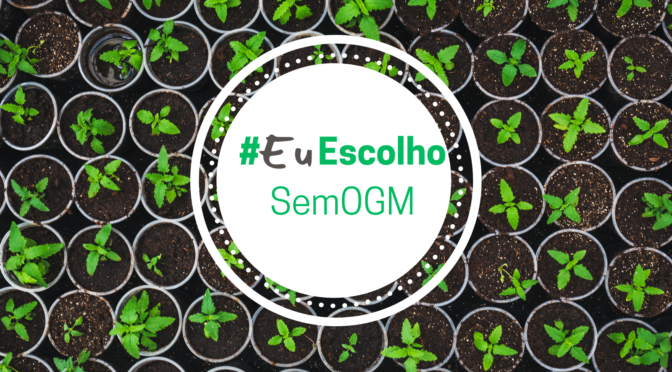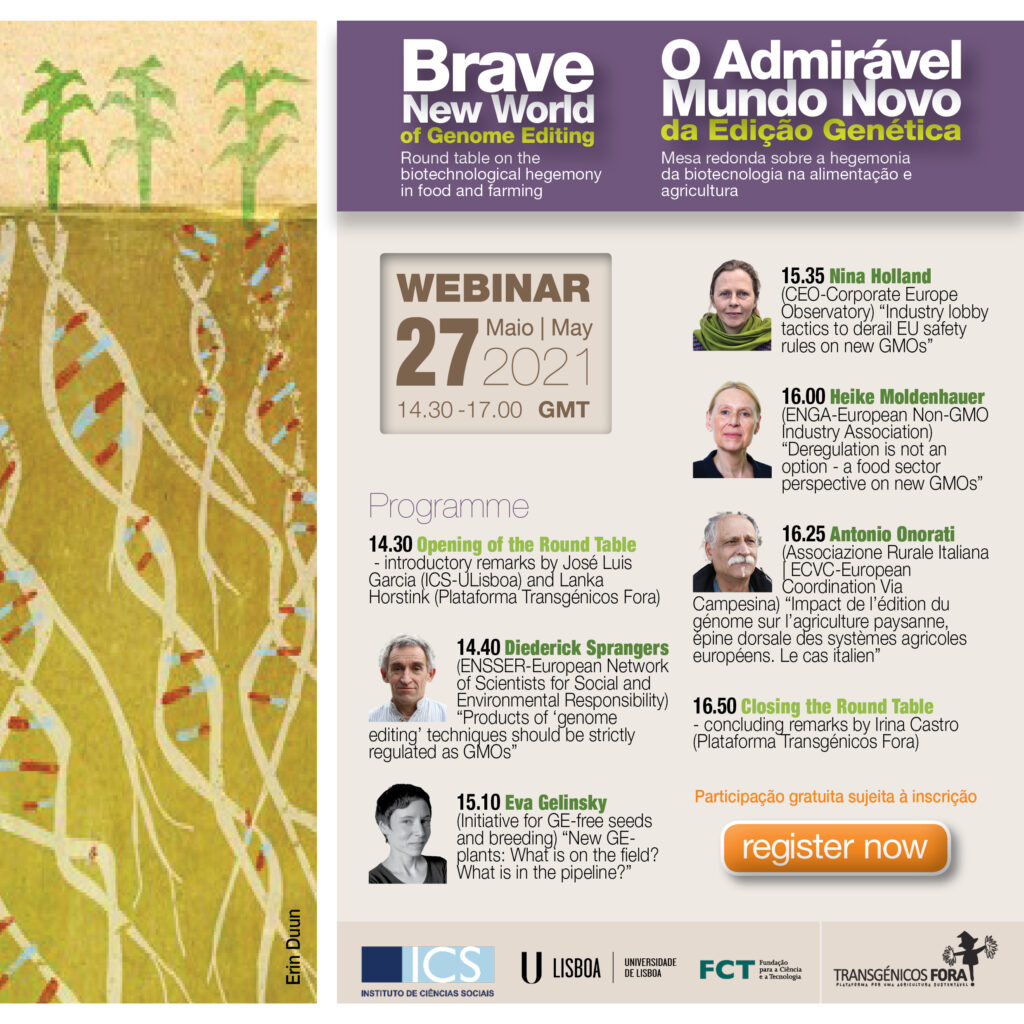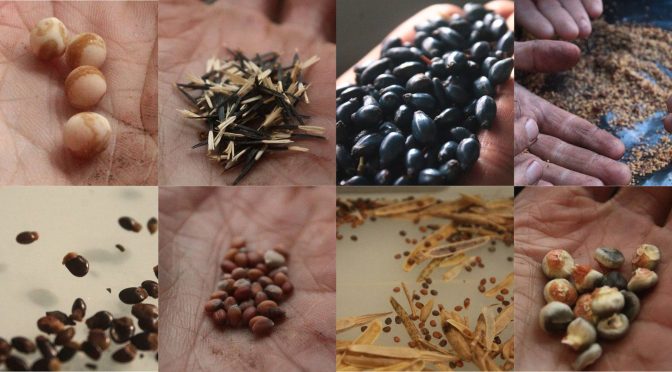Plataforma Transgénicos Fora

Comunicado de Imprensa
Bruxelas, 5 de Abril de 2022
NÃO À DESREGULAMENTAÇÃO DOS ALIMENTOS COM NOVOS OGM!
Queremos decidir o que comemos e o que semeamos!
Hoje, dia 5 de Abril, 36 organizações da sociedade civil, provenientes de 17 países da União Europeia, entre eles Portugal, lançam uma petição para travar a desregulamentação em curso dos organismos geneticamente modificados (OGM) de segunda geração. Apesar da decisão do Tribunal de Justiça da União Europeia ter confirmado que estes novos produtos de bioengenharia se enquadram na legislação para OGM, o desejo da indústria agroquímica de explorar estas novas e promissoras avenidas de lucro está a sobrepor-se aos direitos dos consumidores e agricultores à liberdade de escolha, à saúde pública e do ambiente.
Como chegamos até aqui? A biotecnologia é uma área de negócio em que os conhecimentos da Biologia, que estuda e descreve os seres vivos, são aplicados na criação de produtos e serviços comerciais. É certo que os investimentos precisam do retorno da sua comercialização, mas faz sentido que a busca de lucro crie mais problemas do que aqueles que um dado produto se propõe resolver? É sensato continuar a comercializar produtos sintéticos, mesmo aparentemente inócuos, sem um forte controle ético, ambiental e jurídico?
O primeiro organismo vivo sintético, com o ADN alterado em laboratório e por isso designado de organismo geneticamente modificado, foi patenteado em 1980, nos EUA. Com esta tecnologia iniciou-se uma nova era civilizacional em que, em nome do progresso, a vida está reduzida a mera mercadoria. Esta mudança radical está a consumar-se todos os dias, paulatinamente, diante dos nossos olhos sem nos apercebermos.
Passados 24 anos da chegada dos OGM à Europa, a produção e comercialização de produtos e alimentos OGM faz-se em larga escala, a nível planetário, pese embora, devido à resistência dos consumidores, a diversidade de plantas OGM seja ainda muito limitada – trata-se sobretudo de soja, milho, colza e algodão. Também se tem multiplicado os problemas associados (e.g., variedades tradicionais estão a desaparecer, a resistência das pragas está a aumentar, o uso de pesticidas e herbicidas em vez de diminuir como prometido, tem aumentado).
Não obstante a resistência dos mercados, a biotecnologia continua a ser uma promissora área de negócio em que se ganha dinheiro com uma combinação de direitos de propriedade intelectual (patentes) que auferem um monopólio, e a venda em pacote de sementes OGM com os agroquímicos que lhes são associados, através de contratos vinculativos que retiram qualquer poder de decisão ao agricultor. As patentes sobre plantas e animais, tornadas possíveis com o advento dos OGM, têm se multiplicado na última década e incidem cada vez mais sobre variedades naturais, património de todos, apesar da legislação europeia não o permitir (No Patents On Seeds). Como é possível que esta inaudita mercantilização da vida e a falência ética que acarreta não tenham ainda merecido um amplo e aprofundado debate público?
Este contexto explica a forte desconfiança e a grande contestação dos cidadãos face aos OGM que, na UE , estão regulamentados e obrigatoriamente rotulados. No entanto, apesar de não terem solucionado nenhum dos problemas que justificaram a sua criação existe agora uma 2ª geração de organismos sintéticos, os Novos OGM, frutos de uma tecnologia muito mais poderosa e potencialmente muito mais perigosa, a chamada edição genética (como CRISPR/Cas). As mega-empresas de agroquímicos e sementes OGM são da opinião que estes novos organismos sintéticos nem devem ser considerados OGM uma vez que a edição genética já não usa adição de genes de outras espécies ao genoma em que intervém.
Sob forte pressão do sector a Comissão Europeia está agora a considerar a abolição das regras de rotulagem e o enfraquecimento do controlo de segurança para os Novos OGM em claro desrespeito pelo parecer do Tribunal de Justiça da União Europeia, de Julho de 2018(1).
O que deve ser feito? Os governos devem apoiar soluções testadas para uma agricultura sustentável e resiliente às alterações climáticas, tais como as práticas agroecológicas e a agricultura biológica promovidas pelas estratégias “Do Prado ao Prato” e “Biodiversidade” (vide o parecer da PTF sobre esta matéria).
Exortamos por isso o nosso governo bem como os decisores europeus a recusar todas as tentativas que excluam os Novos OGM da actual legislação Europeia sobre os OGM e a serem firmes na obrigatoriedade das verificação da segurança, transparência e rotulagem relativamente a Velhos e Novos OGM. Só assim será garantida a segurança dos nossos alimentos, a protecção da natureza, do meio ambiente e da liberdade de escolha.
A petição está disponível aqui em português, juntamente com um guia rápido de perguntas e respostas para compreender o que são os Novos OGM e o que está em causa.
Contactos para jornalistas:
Lanka Horstink (Plataforma Transgénicos Fora) Em. info@stopogm.net Tm. +351 919 852 781
Mute Schimpf (Friends of the Earth Europe) Em. mute.schimpf@foeeurope.org Tm +32 475 703 475
—
A Plataforma Transgénicos Fora é uma estrutura composta por voluntários oferecem o seu tempo para uma luta que é de todos. São estas as entidades não-governamentais da área do ambiente e agricultura que apoiam o trabalho da Plataforma: AEPGA, Associação para o Estudo e Proteção do Gado Asinino; Campo Aberto, Associação de Defesa do Ambiente; CNA, Confederação Nacional da Agricultura; CPADA, Confederação Portuguesa das Associações de Defesa do Ambiente; GAIA, Grupo de Ação e Intervenção Ambiental; GEOTA, Grupo de Estudos de Ordenamento do Território e Ambiente; LPN, Liga para a Proteção da Natureza; MPI, Movimento Pró-Informação para a Cidadania e Ambiente; PALOMBAR, Associação de Conservação da Natureza e do Património Rural; QUERCUS, Associação Nacional de Conservação da Natureza e ZERO, Associação Sistema Terrestre Sustentável. Contactos: info@stopogm.net e www.stopogm.net
Mais de 10 mil cidadãos portugueses reiteraram já por escrito a sua oposição aos transgénicos.
(1) Este parecer determina que os Novos OGM são organismos geneticamente modificados e, portanto, estão abrangidos pela legislação em vigor. Esta regulamentação baseia-se no Princípio da Precaução, o garante da protecção dos recursos naturais e da transparência em toda a cadeia de abastecimento, quer para os cidadãos, quer para os profissionais do sector.



